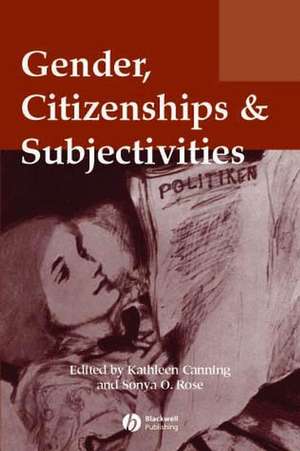Gender, Citizenships and Subjectivities: Gender and History Special Issues
Autor Canningen Limba Engleză Paperback – 19 mai 2002
Preț: 330.35 lei
Nou
Puncte Express: 496
Preț estimativ în valută:
63.22€ • 65.76$ • 52.19£
63.22€ • 65.76$ • 52.19£
Carte tipărită la comandă
Livrare economică 14-28 aprilie
Preluare comenzi: 021 569.72.76
Specificații
ISBN-13: 9781405100267
ISBN-10: 1405100265
Pagini: 248
Dimensiuni: 155 x 233 x 14 mm
Greutate: 0.37 kg
Editura: Wiley
Seria Gender and History Special Issues
Locul publicării:Chichester, United Kingdom
ISBN-10: 1405100265
Pagini: 248
Dimensiuni: 155 x 233 x 14 mm
Greutate: 0.37 kg
Editura: Wiley
Seria Gender and History Special Issues
Locul publicării:Chichester, United Kingdom
Public țintă
postgraduates (graduate students), university and college teachers in a wide range of national and disciplinary fields: Sociology, History, Anthropology, Women′s Studies, Political ScienceNotă biografică
Kathleen Canning is associate professor of History and Women's Studies at the University of Michigan. She is the author of Languages of Labor and Gender: Female Factory Work in Germany 1850-1914 (Cornell University Press, 1996) and is currently working on a new book, Embodied Citizenships: Gender and the Crisis of Nation in Weimar Germany. Sonya O. Rose is Professor of History, Sociology and Women's Studies at the University of Michigan. She is the author of Limited Livelihoods: Gender and Class in Nineteenth Century England (University of California Press, 1992) and co-editor with Laura L. Frader, of Gender and Class in Modern Europe (Cornell University Press, 1996). She has recently completed work on a new book, Which People's War? National Identity and Citizenship in World War II Britain (forthcoming).
Descriere
Explores the relationship of citizenship and gender across a range of regions, nations and historical time periods. In this title, each case study is an exploration of how gender shaped citizenship as a claims-making activity, and how women, often aligned with immigrants and minorities, took a leading role in articulating these claims.































